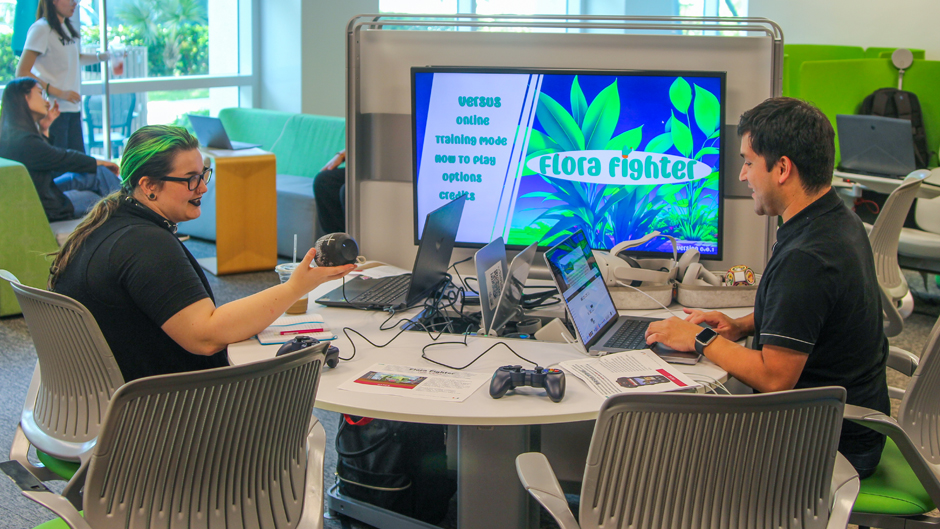Veda Cruz spends about five hours a week playing video games. She wishes it were more, but Cruz can’t complain. She loves her job.
Yet Cruz, a triple ’Cane who earned a J.D. from the University of Miami School of Law and an M.B.A. from the Miami Herbert Business School in 2019, was once unsure of her desired career path.
That all changed in her last semester of law school. Cruz discovered and attended a one-week class in video game law. It was kismet.
The class helped Cruz realize she could combine her gaming, creativity, law, and business passions. A year later, she began working as in-house counsel for Gearbox, a major video game development company that makes Borderlands, among other games.
Now, Cruz wants to share her knowledge about the thriving video game industry with current University of Miami students. She and David Greenspan, a lawyer with 25 years of experience in the gaming field, are joining forces to provide their insight with students interested in the video game industry through a class offered this spring in the School of Communication.

“I want to help students who love video games and might not know there are careers in the video game world that aren’t just coding or art jobs,” said Cruz, who met Greenspan when she took his one-week class in 2019. “But also for game developers, it’s important to know the law because so much goes into video game development.”
The course will draw upon Greenspan’s book, “Mastering the Game: Business and Legal Issues for Video Game Developers,” which he published in 2014 and updated with colleagues in 2022 for the World Intellectual Property Organization, a division of the United Nations. Greenspan now uses the open-source textbook to teach students at Santa Clara University’s School of Law.
Cruz added that since the University of Miami’s class is open to all undergraduates—and not just law students—they will also incorporate other articles and texts.
“No matter the path that students take, if they are interested in the video game industry, they should know these fundamentals,” she said. “There’s so much that goes into game development, so I want to teach them in a fun way.”
Originally a lawyer for the film industry, Greenspan transitioned to video games in the mid-1990s and soon joined Sony’s game development studios as in-house counsel in 1996, just after the first PlayStation console was released in America. While at Sony, he helped the company work with game developers to create content for PlayStation and its successors, but he also helped to generate and close deals with major sports leagues to produce games like his favorite, NHL FaceOff. Greenspan went on to also work for Bandai NAMCO Entertainment, which created Pac-Man and Tekken, as well as THQ and Midway Games.

He is eager to teach the first undergraduate class on the subject at the University, which will give a primer on topics such as contracts, intellectual property law, and crucial regulations that impact the entertainment industry, along with business, marketing, licensing, and music-related issues.
“It’s an injustice for any school to teach undergrads about game development, yet not to teach them about the ownership of their games,” Greenspan said. “If you want to create your own game, you need to understand many of the legal and business issues involved, so I’m thrilled that the University of Miami is doing this. They are a leader in this field.”
Having a functional understanding of these topics could also benefit students who want to pursue a variety of careers, said Kim Grinfeder, chair of the Department of Interactive Media, who helped get the course approved.
“This class will really show the breadth of the video game industry to our students, and having both David and Veda teach together is like the dream team,” said Grinfeder. “They are both so enthusiastic about their careers that I know students will get a lot out of this class. I’m interested in seeing the outcomes.”
To pitch the class, Cruz initially approached Lindsay Grace, an associate professor and Knight chair in Interactive Media who is also a video game designer and leads many game development courses at the School of Communication. Grace thought the course was a unique addition to the department’s roster because he does not know many undergraduate courses that delve into topics like these.
“Games serve as a great historical case study for a variety of questions around intellectual property and law,” Grace said. “Students who may never work with a game franchise will learn valuable information about the non-disclosure agreements and non-compete clauses their future employers in tech may have them sign, among other types of agreements, restrictions, and opportunities.”
Cruz and Greenspan look forward to sharing more about the thriving $185-billion industry, which has surpassed revenues in film, books, and even the sports industry, Greenspan said.
“Our goal is to educate people,” Greenspan added. “While many of these students may not become lawyers, if they are game developers, they still need to know enough to be able to ask the right questions to protect their rights, and to not infringe on the rights of others.”
To enroll in the class, search for “CIM 489/689 section J – Business and Legal for Games” in CaneLink.

